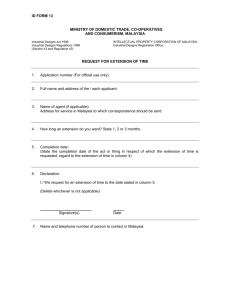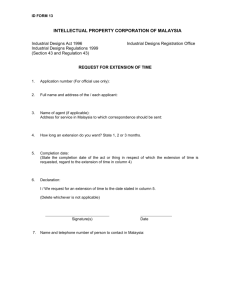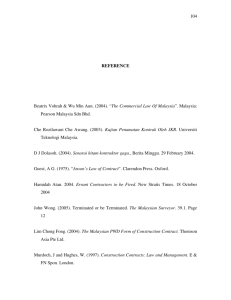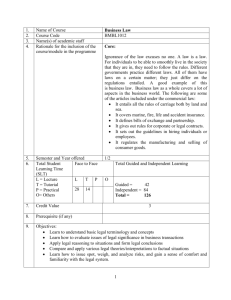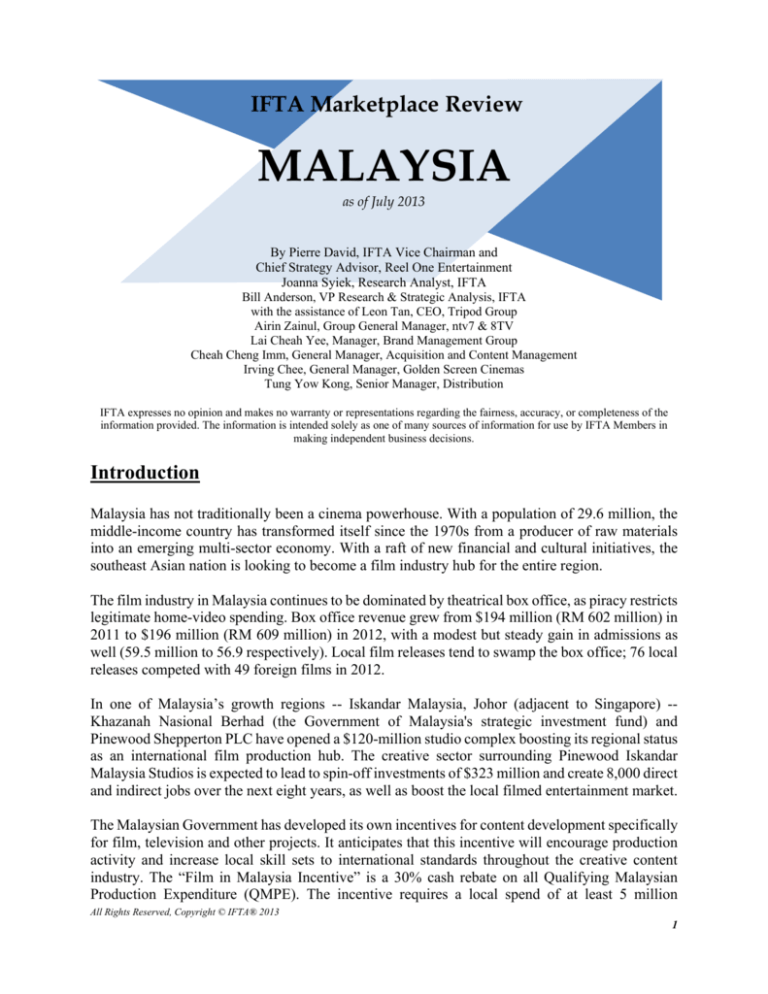
IFTA Marketplace Review
MALAYSIA
as of July 2013
By Pierre David, IFTA Vice Chairman and
Chief Strategy Advisor, Reel One Entertainment
Joanna Syiek, Research Analyst, IFTA
Bill Anderson, VP Research & Strategic Analysis, IFTA
with the assistance of Leon Tan, CEO, Tripod Group
Airin Zainul, Group General Manager, ntv7 & 8TV
Lai Cheah Yee, Manager, Brand Management Group
Cheah Cheng Imm, General Manager, Acquisition and Content Management
Irving Chee, General Manager, Golden Screen Cinemas
Tung Yow Kong, Senior Manager, Distribution
IFTA expresses no opinion and makes no warranty or representations regarding the fairness, accuracy, or completeness of the
information provided. The information is intended solely as one of many sources of information for use by IFTA Members in
making independent business decisions.
Introduction
Malaysia has not traditionally been a cinema powerhouse. With a population of 29.6 million, the
middle-income country has transformed itself since the 1970s from a producer of raw materials
into an emerging multi-sector economy. With a raft of new financial and cultural initiatives, the
southeast Asian nation is looking to become a film industry hub for the entire region.
The film industry in Malaysia continues to be dominated by theatrical box office, as piracy restricts
legitimate home-video spending. Box office revenue grew from $194 million (RM 602 million) in
2011 to $196 million (RM 609 million) in 2012, with a modest but steady gain in admissions as
well (59.5 million to 56.9 respectively). Local film releases tend to swamp the box office; 76 local
releases competed with 49 foreign films in 2012.
In one of Malaysia’s growth regions -- Iskandar Malaysia, Johor (adjacent to Singapore) -Khazanah Nasional Berhad (the Government of Malaysia's strategic investment fund) and
Pinewood Shepperton PLC have opened a $120-million studio complex boosting its regional status
as an international film production hub. The creative sector surrounding Pinewood Iskandar
Malaysia Studios is expected to lead to spin-off investments of $323 million and create 8,000 direct
and indirect jobs over the next eight years, as well as boost the local filmed entertainment market.
The Malaysian Government has developed its own incentives for content development specifically
for film, television and other projects. It anticipates that this incentive will encourage production
activity and increase local skill sets to international standards throughout the creative content
industry. The “Film in Malaysia Incentive” is a 30% cash rebate on all Qualifying Malaysian
Production Expenditure (QMPE). The incentive requires a local spend of at least 5 million
All Rights Reserved, Copyright © IFTA® 2013
1
Malaysian Ringgits – around $1.6 million – for foreign productions, or some $830,000 for local
films and does not have a cap. The scheme kicked off February 1, 2013 and includes both
production and post-production activities.
Hollywood titles and independent titles (including some art house fare) performed relatively well
last year in Malaysia. Action and adventure films tend to perform well, even though censorship in
Malaysia prohibits nudity and some profanity (though profanity towards oneself is typically
allowed, but banned when directed at another person).
There is still a limited demand for independent films in Malaysia. However certain independent
titles, such as “The Artist” and “The Hurt Locker,” have found an audience in the country. Deals,
however, are still very selective. Indie titles are usually Asian independent films reflecting the
commercial realities in the marketplace.
Theatrical
While not one of the largest Asian nations, Malaysia has a fast-growing cinema infrastructure. The
country has gone from having just 287 screens five years ago to over 800 now. Box office take
last year was $196 million, double the level five years ago.
The cinema market in Malaysia is rapidly growing. Malaysia typically produces about 20 feature
films annually, and between 300–400 television dramas (soap operas) and serials not counting the
in-house productions done by the individual television stations. However, the number of films
produced and screened in Malaysia recorded a triple increase last year with over 70 local titles
released in theatres. The openings of new cinemas, along with the country’s limitation on screening
foreign films that do not pass censorship, has resulted in the increase of domestic film production.
Currently, the Malaysian film industry also faces competition from surrounding regional markets
such as Indonesia, Thailand, Philippines, and India.
Malaysia highly encourages foreign film producers to shoot on location in Malaysia and undertake
film co-production ventures so that local artists and technicians have the opportunity to gain
exposure and experience. Among the moves to encourage further international interest was the
debut of the new 30% tax rebate scheme. The scheme, which kicked off in early February, includes
production and post-production expenditures and is available for both Malaysian and foreign
production activities.
Malaysia also recently launched the International Film Festival of Malaysia, which had its first
edition in November 2012. Parallel to the festival, Malaysia hosted its first-ever film market, the
Kuala Lumpur Content and Communications International Market, which brought together players
from the television, music, gaming and fashion industries.
On March 29, 2012, the Film Censorship Board of Malaysia released new, color-coded logo
designs for cinema films' classification. U or 'Umum' is now blue, which means that a film can be
watched by all ages and consists of only positive depictions of values. P13 or 'Penjaga 13' is yellow,
which signifies that caution should be taken when watching the film as it is not suitable for
individuals below 13. Any viewers of that age must be accompanied by a parent or guardian. 18 is
All Rights Reserved, Copyright © IFTA® 2013
2
red, which signifies that the film is only suitable for viewers aged 18 and above as it contains
images of violence, horror and sex, as well as religious, political and social elements. All of these
changes went into effect in April 2012.
Malaysia’s government continues to focus on bolstering the country’s film market, particularly
through the National Film Development Corporation Malaysia (FINAS). The National Film
Development Committee was formed by the government on July 26, 1980 to outline the ways to
improve Malaysian film industry. Now, since April 2009, FINAS is an agency under the Ministry
of Information, Communication & Culture. FINAS recently helped ensure Malaysia’s
participation at the European Film Market in Berlin where over 80 countries purchased the rights
to distribute Malay films, particularly those of KRU Studios.
Exhibitors
There are about 250 movie theatres and cineplexes in Malaysia, showing local and international
fare. The largest cinema operator is Golden Screen Cinemas. Other large operators include TGV
Cinemas, MBO Cinemas, Lotus Five Star and Big Cinemas. There are also several smaller
operators.
Golden Screen Cinemas Sdn Bhd (GSC) is the leader in exhibition for Malaysia, dominating with
more than 230 screens. The competitors with the next highest reach include MBO Cinemas (owned
by Navis Capital Partners, an Asian private equity firm) and TGV Cinemas with 187 and 168
screens respectively.
Various other players include Lotus Five Star, Big Cinemas, Cathay and Hock Star. Navis took
control of Reliance’s Big Cinemas theatre chain in Malaysia last year. The acquisition, along with
already-owned MBO Cinemas, cements Navis' position as the second largest exhibition group in
Malaysia.
Many exhibitors have been pursuing a shift to digital screens. While digital is not yet ubiquitous
in the territory, leaders such as MBO Cinemas made significant strides to add more digital screens
last year. They plan to go fully digital by the end of 2013.
Primary Exhibitors:
Golden Screen Cinemas
Golden Screen Cinemas Sdn Bhd (GSC) is the leading cinema exhibitor in Malaysia. GSC is a
wholly owned subsidiary of PPB Group (a member of the Kuok Group). It is the largest chain of
cinemas in Malaysia. It owns the largest cinema in Malaysia, the Midvalley Megamall in Kuala
Lumpur, which is also Asia's largest Cineplex with 18 screens and 2,332 seats.
There are 28 GSC cinemas in Malaysia with 238 screens as of 11 April 2013. The first GSC cinema
to operate in Malaysia was opened in Kota Kinabalu on 14 July 1981. International movies are
only shown in select GSC cinemas.
All Rights Reserved, Copyright © IFTA® 2013
3
MBO Cinemas
MCAT Box Office (MBO) Cinemas with its 187 screens is the second largest in terms of screens
after Golden Screen Cinemas. Its biggest cinema (in terms of number of screens) is located at
Harbour Place in Klang. It houses 11 screens and has 1,362 seats. MBO Cinemas offers both 2-D
and 3-D exhibition of U.S. and local Malaysian feature films.
TGV Cinemas
TGV Cinemas Sdn Bhd (TGV Cinemas) is the third largest cinema chain with 168 total screens.
Since its inception in 1995, TGV Cinemas has grown to become one of Malaysia’s premier film
exhibition companies and has established a name for itself as a pioneer in the cinema industry. The
chain shows a combination of major studio content, independent films, local Malaysian and other
Asian feature films. The biggest TGV cinema is located in Sunway Pyramid, with 12 screens and
2,598 seats. TGV Cinemas is rebranding itself, launching their new concept for a cinema hall
named as “Beanieplex” (also known as 'the bean bag hall'), which the seats are all replaced by bean
bag cushions. The Beanieplex is available at TGV Sunway Pyramid and several other theatres.
Lotus Five Star Cinemas
Lotus Five Star is a fast-growing cinema chain that began operations in the 1980s. There are 24
Lotus Five Star Cinemas in Malaysia. Its biggest cinemas are located in Segamat and in Penang.
They house 8 screens each and feature 1,703 and 1,512 seats respectively.
Big Cinemas
Big Cinemas, a division of Reliance MediaWorks Ltd and a member of Reliance ADA Group, is
a theatre chain with over 515 screens in India, U.S., Malaysia, and the Netherlands. In Malaysia,
the company now has 66 screens that play Hollywood features, Chinese films, as well as Tamil
films to cater to the local Tamil population of 1.5 million. The company accounts for 10% to 15%
of local box office contributions for wide movie releases.
Malaysian Cinema Data
OPERATOR WITH THE MOST SCREENS
Rank Operator Total # of Screens 1 Golden Screen Cinemas
238
2 MBO Cinemas
187
3 TGV Cinemas
168
4 Lotus Five Star
87
5 Big Cinemas
66
6 Cathay Cineplex
30
7 Hock Star Cineplex
22
Source: IFTA Analysis of company websites
All Rights Reserved, Copyright © IFTA® 2013
4
Distribution
Traditional film distribution still works well in Malaysia, and the country along with the rest of
Asia is learning the ways in which new media and the film business are merging.
Malaysia has a strict censorship policy for its film and television industry, as Islam is the
predominant religion of the country. All films must be reviewed by the Malaysia Film Censorship
Board (LPF) prior to public viewing.
Primary Malaysian Distributors:
Golden Screen Cinemas
Golden Screen functions not only as Malaysia’s largest exhibiting theatrical chain, but also as a
financier and distributor of local Malaysian product. They have been known to give advances for
completed local films in order to facilitate signing deals to become the distributor of the film. They
purchase and distribute many local Malay titles (as well as Hollywood and foreign titles) through
their cinema chain. Recent independent theatrical releases include The Last Stand and Naked
Soldier.
Astro Shaw Sdn Bhd
Astro is a Malaysia-based multimedia group with established DTH satellite, multi-channel
subscription TV services and radio broadcasting. It is also active in production and distribution of
films and television programming. It has a production arm called ASTRO SHAW SDN BHD with
3 subsidiaries (Tayangan Unggul Sdn. Bhd., Nusantara Films Sdn. Bhd., Karya Anggun Sdn.
Bhd.). These subsidiaries produce product for the Astro brand, which Astro distributes theatrically
(and later to satellite and subscription TV).
Astro Acquisitions
(Overall view of films acquired in the last 18 months by origin, genre and type of rights)
Source: Cinando
Suraya Filem production & Distribution Sdn. Bhd
Smaller outfit Suraya mainly acquires international product. Recent acquisitions include An
Enemy, The Rover, Side Effects, The Woman in Black, and Dracula 3D. Most of its pickups come
from Western Europe and Australia, with deals spanning All Rights and VOD.
All Rights Reserved, Copyright © IFTA® 2013
5
Cathay-Keris Films
One of Singapore’s leading film distributors, Cathay-Keris also focuses on providing content for
Malaysian audiences. In addition to distributing films from independent producers and major
studios, Cathay-Keris Films also acquires art house films internationally. Cathay-Keris Films owns
and manages the Cathay Classic Film Library comprising more than 270 Mandarin, Cantonese and
Malay titles. Most of the titles have been digitally-restored to European broadcast standards.
Nusantara Edaran Filem
Nusantara was the Malaysian theatrical distributor for the Arnold Schwarzenegger film “The Last
Stand.” It was also the distributor for several big Hollywood titles, including: Forbidden Kingdom,
The Expendables, and the Twilight franchise. Reportedly, Eclipse grossed RM6 million ($1.98
million), New Moon took in about RM7 million ($2.31 million), while Twilight took about RM3
million or more ($1 million). In total, the three films grossed about RM16 million ($5.27 million).
Lotus Five Star Sdn Bhd
In addition to Lotus Five Star Sdn. Bhd’s work in exhibition, the company also specializes in the
distribution of Indian films in Malaysia. They are the main distributors of Tamil and Hindi films,
including DVD and VCD distribution rights as well. The company’s parent, Lotus Group, also has
established Audio/Video outlets offering original audio and video movies, making it a one stop
shop for purchasing DVD’s and VCD’s.
Metrowealth Pictures Sdn Bhd
As of February 2013, local film production company, Metrowealth Pictures Sdn Bhd was chosen
by Apple Inc. to be the sole distributor of Malay films internationally through iTunes. The
company plans to highlight its catalogue titles as well as open the market to other Malay films.
Release Costs
Malaysian exhibitors have started to shift to digital quite rapidly, but theatres will still take a mix
of digital and physical prints. Digital prints require Virtual Print Fees to be paid to the exhibitors
via industry agreements which can cost about $800 per print. A 35mm film print goes for $1,500
in comparison.
The 3D format is not available in Malaysia due to the high cost of having studios produce an edited
version of a film for Malaysian screenings.
Most foreign films are subtitled open entry to Malaysia. Subtitling costs are usually folded into an
All Rights deal when a distributor takes a film. Normally, the Malaysian distributor will take care
of any subtitling or dubbing unless the producers are very particular about the translation.
All Rights Reserved, Copyright © IFTA® 2013
6
Blockbusters are typically released on 100-120 prints with giant “franchise” titles released on 200
prints. A standard wide release for a successful independent film is 40-60 prints. Art house films
are released on about 10 prints.
Pricing
All Rights deals can range anywhere from $5,000 to $500,000. Buyers are willing to pay about
$5,000-15,000 for an arthouse release. A solid independent film can generate anywhere from
$50,000 to $200,000. Larger films can go for anywhere from $200,000 to $500,000, with some
blockbusters ranging up to $1 million. The majority of revenue for deals in Malaysia will come
from theatrical.
Home-Video
Along with most of the rest of the region, the Malaysian home video market has seen a decline.
While piracy is considered low for the region, much content makes its way onto the Internet less
than 24 hours after release. Thus, piracy remains one of videos biggest competitors. Retail piracy
in kiosks and malls (including pirated movies in or claiming to be in Blu-ray format) has notably
cut into potential home video revenues.
In addition to its exhibition and distribution operations, Lotus Group runs one of the few one-stopshops for purchasing DVDs and VCDs.
Pricing
Piracy has negatively shifted the entire home video market, but when video deals are possible they
range from $500-$5,000. The direct-to-DVD market does not exist. It is extremely rare to do a
video only deal in Malaysia – most films are sold as All Rights Deals.
Television
There are currently eight national, free-to-air terrestrial television channels in Malaysia and two
national pay subscription television services. 24-hour television was introduced in Malaysia in
1989 on TV1. The first 24-hour broadcasting in Malaysia was introduced in 2007 by TV2. Still,
not all channels feature a 24-hour schedule
Currently, analog is the most widespread television delivery standard in Malaysia. Analog
terrestrial transmissions have been scheduled to be switched off in phases as part of a digital
switchover, expected to be completed in 2020. The frequency of these digital switchovers have
mostly been delayed to avoid signal jamming with television in Thailand.
Free Television
Media Prima is the dominant free-to-air broadcaster, operating channels TV3, NTV-7, 8TV and
TV9. Its channels account for more than half of TV viewing. The broadcaster has scaled down
All Rights Reserved, Copyright © IFTA® 2013
7
an aggressive acquisitions strategy and regional expansion plans in view of the changing economic
conditions. However, the advertising market remains resilient. Media Prima has seen a gradual
decline in its audience share as satellite pay TV service Astro’s bouquet channels gain popularity.
Free-to-air public broadcaster RTM is leading the transition to digital terrestrial TV (DTT).
RTM conducted DVB - T2 trial transmission and started DTT services in early 2013. Analog
switch-off is set for 2015. The platform began offering 19 channels from 2012, one of which airs
HD programming. The local RTM channels have the name RTM and the state name, for example
“RTM Penang” in Penang. Each channel has its own schedule and broadcasting hours, and some
channels relay programming from RTM1 and RTM2 (usually news programs and government
programs).
Though primarily a pay-TV satellite service, Astro in collaboration with the government of
Malaysia launched a free satellite television service, NJOI, in February 2012. The service
currently provides 18 television channels and 19 radio station, which include RTM's TV1 and TV2,
TVi, CCTV-4, Bernama TV, Astro Prima, Astro Oasis, Astro Awani, Astro AEC, Astro Xiao Tai
Yang, Jia Yu, Astro Vaanavil, Makkal TV and all AMP Radio channels including hitz.fm, ERA
and MY FM. An existing Astro customer can receive this service through a separate account. The
set-up, which consists of a set-top box, Out-Door Unit (ODU) satellite dish, smartcard and remote
control unit, is available at a one-time payment of RM 288 ($97) via an Astro retailer, with a
standard installation fee of RM 100 ($34) from an Astro authorized installer.
Malaysia’s primary language is Bahasa with English as its secondary language. The country also
features the second largest Chinese population after the mainland itself. Therefore, the country
features many Chinese free-to-air channels. The content on these channels typically does not come
from Chinese companies and instead features programming from local Malaysia companies with
a small percentage coming from a few international independents. Most of the product is sub-titled
in Tamil, though many in Malaysia are literate in both Mandarin and Cantonese.
Astro will show independent television programs and independent feature films. RTM is much
less likely to make these kinds of deals. While many of the networks do have in-house production
arms, they still receive a notable amount of content from outside partners. In-house production
typically produces non-drama and non-movie programming. For example, many channels will
create their own reality shows along with licensing finished product (Idol, X-Factor, Project
Runway, etc.) from the U.S. and abroad as well. Pay Television
DTH platform Astro dominates Malaysia’s pay TV Market. Its more than 3 million subscribers
represent almost the entire local pay TV sector. Despite having more than half of the country’s
5.1 million TV households as subscribers, Astro continues to record strong subscriber growth.
Because the pay TV market is almost 100% digital, Malaysia has one of the lowest TV piracy rates
in the region. Astro launched an HD DVR in late 2009 and an IPTV service in April 2011.
Opportunities for rival pay TV companies are limited because Astro controls most of the popular
content. It currently holds exclusive rights from the Malaysian government to offer satellite
television broadcasting services in the country through the year 2017.
All Rights Reserved, Copyright © IFTA® 2013
8
IPTV is the most likely challenger. Telekom Malaysia has conducted lengthy IPTV trials and
launched its Hypp.TV service commercially in March 2010. There are several other IPTV
platforms, which aim at more niche markets such as the country’s Indian or Chinese populations.
Pricing for TV Rights
Many networks offer feature films as a part of their primary programming, screening about five to
six movies a week. These are mostly major studio fare however the occasional independent release
with awards or names attached may be considered. This is a somewhat recent development as just
a few years ago, TV services would not pick up any movies for their programming slate.
TV rights for independent films can start at low as $2,000 and go to $5,000. Series programming,
such as a popular American variety program, will go for about $3,000 an hour.
For Pay-TV deals, prices can be similar; however, because most Pay-TV services’ footprint goes
beyond Malaysia, this will have to factor into the price. Thus, most pay-TV deals start at $3000
and range higher. However for independents, television prices depend largely on a film’s U.S. box
office performance.
NEW MEDIA
In Malaysia, adoption of IPTV, mobile TV and VOD has been slow, only starting to show growth
over the past few years. Though piracy is lower than in neighboring regions, it still is a significant
factor in shaping the marketplace.
Under the “My Creative Content” initiative, which is part of Malaysia’s Economic Transformation
Program, the Malaysian government has expanded its plans to transform Malaysia into a regional
hub for digital content, with the aim of capitalizing on the expanding value of the Asia Pacific
entertainment market. In addition to the focus on local and international filmed entertainment, the
initiative targets global intellectual property development through international coproduction
programs and partnerships with international distributors.
Video on Demand
The most popular form of VOD in the region is Catch-up VOD which is offered on a transactional
VOD basis from most TV services. Astro and Telekom’s IPTV services are the most prominent in
the region. Programming typically includes rebroadcasting from other channels, select
international channels (such as Warner TV or BBC), and some select films.
Continued growth is expected in digital delivery through subscription providers such as Telekom
Malaysia’s Unifi and ASTRO’s Beyond IPTV. Last August, Astro launched its ‘Astro Best’
service that offers Hollywood and Asian movies available on both DTH (Direct-To-Home)
satellite and IPTV (Internet Protocol Television) platforms as early as three months after theatrical
release and in high-definition where available. Titles are available for RM10 ($3.30) each and are
made available for 48 hours after purchase. Customers can purchase Astro Best movies via SMS
All Rights Reserved, Copyright © IFTA® 2013
9
on Astro Channel 481 with up to 12 different viewing times for each movie. Astro continues to
work with international studios like The Walt Disney Company, Lionsgate, Sundance Channel,
Animax, Fortune Star, CJ Media and Unitel Classica so that Malaysians can access the studios’
library of Hollywood and Asian titles.
Another new paid IPTV provider, DETV, owned by REDtone, provides television and video-ondemand services on its platform, targeting the Chinese audiences in Malaysia. Additionally all
aired programs are also stored on the company's servers and made accessible for up to 72 hours
after airing, a standard function provided by most IPTV providers.
In late 2011, 1Malaysia TV became the first TV channel offered via Internet. It provides free-toair channels (RTM1, RTM2, TV3, and Al-Hijrah), China Central TV News (CCTV1), My Youth
TV (MyTV), a Korean entertainment channel (eKorea TV), Documentary Television, an Internet
radio station (KL POP Radio) via its website (free to consumers, ad-supported). It also recently
made its platform available on smart phones and other mobile devices.
Pricing
With VOD still gaining traction in the territory, there is no standard deal in place. VOD deals vary
by the length of the deal and volume of product. Most operators offer multi-year deals. Deals are
mostly revenue sharing through a multi-platform deal. However, some players prefer to do straight
forward Minimum Guarantee deals with a flat fee for all VOD rights.
All Rights Reserved, Copyright © IFTA® 2013
10
Appendix I: Malaysia Box Office 2012
2012 Malaysia Box Office: Top 10 Movies Rank Title Distributor
Box Office Sales ‐ in millions 1 2 3 4 5 6 7 8 9 10 The Avengers (2012) The Amazing Spider‐Man Skyfall Chinese Zodiac Battleship The Dark Knight Rises MIB 3 The Expendables 2 The Hobbit: An Unexpected Journey Journey 2: The Mysterious Island Disney Sony Sony Golden Sceen UIP WB Sony n/a WB WB $10.97 $7.12 $6.65 $6.46 $6.42 $5.76 $5.11 $5.03 $4.84 $4.45 2012 Malaysia Box Office: Top 10 Indie Movies Rank Title Distributor
Box Office Sales ‐ in millions 1 2 3 4 5 6 7 8 9 10 Chinese Zodiac The Expendables 2 The Twilight Saga: Breaking Dawn Part 2 Step Up Revolution The Hunger Games Cold War Ngo Oi Hk Hei Sheung Ka Hei (2012) The Viral Factor Thuppakki Alls Well That Ends Well Golden Sceen n/a n/a n/a n/a n/a Golden Sceen Golden Sceen FiveStar FiveStar $6.46 $5.03 $4.39 $2.51 $2.20 $2.14 $1.87 $1.80 $1.73 $1.55 2012 Malaysia Box Office: Top 10 Major Movies Rank Title Distributor
Box Office Sales ‐ in millions 1 2 3 4 5 6 7 8 9 The Avengers (2012) The Amazing Spider‐Man Skyfall Battleship The Dark Knight Rises MIB 3 The Hobbit: An Unexpected Journey Journey 2: The Mysterious Island John Carter Disney Sony Sony UIP WB Sony WB WB Disney $10.96 $7.12 $6.65 $6.42 $5.76 $5.11 $4.84 $4.45 $4.35 10 Resident Evil: Retribution Sony $4.23 Source: IFTA Analysis of Box Office Mojo
Date Range December 30, 2011 to January 1, 2013
Note: Box Office Mojo data may be incomplete for date range 12/31/11 to 12/31/12. IFTA Analysis was of available figures as of 7/14/2013.
All Rights Reserved, Copyright © IFTA® 2013
11
Appendix II: Malaysia Theatrical Exhibition
Location Johor # of Cinemas 19 Largest Cinema
Largest Operator
Cathay Cineplex City Square MBO Cinemas ‐ 7 outlets (48 screens and 7,124 seats) Total # of Screens 114 Total # of Seats 22,382
31 5,130
149 28,788
33 6,054
27 5,060
27 4,873
66 11,226
37 7,865
(14 screens and 2,300+ seats)
Kedah 7 GSC Amanjaya Mall
MBO ‐ 2 outlets (8 screens and 1,306 seats) (10 screens and 1,725 seats) GSC Midvalley Megamall MBO Cinemas ‐ 6 outlets (50 screens and 8,047 seats) Kuala Lumpur 22 Melaka 5 GSC Dataran Pahlawan (10 screens and 2,004 seats) Golden Screen Cinemas ‐ 2 outlets Negeri Sembilan Pahang 5 MBO Era Square Mall
Lotus Five Star ‐ 2 outlets (7 screens and 1,304 seats) Golden Screen Cinemas ‐ 3 outlets (18 screens and 2,345 seats)
(20 screens and 3,797 seats)
(10 screens and 1,456 seats) 5 GSC East Coast Mall
(9 screens and 1,633 seats) (20 screens and 3,674 seats)
Penang 10 (12 screens and 1,618 seats) Golden Screen Cinemas ‐ 3 outlets TGV AEON Station 18 MBO Cinemas ‐ 3 outlets (8 screens with 1,610 seats)
(14 screens and 2,470 seats)
GSC Alamanda
Golden Screen Cinemas
8 1,404
43 7,694
47 7,778
184 34,273
5 782
GSC Gurney Plaza
(28 screens and 4,574 seats)
Perak Putrajaya 9 1 (8 screens and 1,404 seats)
Sabah 7 Growball Cinemax Centre Point Sabah Golden Screen Cinemas ‐ 2 outlets Sarawak 9 GSC CityONE Megamall
(10 screens and 1,876 seats) Hock Star Cinema ‐ 4 outlets Selangor 24 Cathays e@Curve
TGV Cinemas ‐ 7 outlets
(16 screens and 2,472 seats)
(61 screens and 12,152 seats)
(16 seats and 2,985)
(14 screens and 1,903 seats)
Terengganu 1 TGV Mesra Mall
TGV Cinemas
(5 seats and 782 seats)
(5 seats and 782 seats)
Source: IFTA Analysis of FINAS data
Data as of January 2013
All Rights Reserved, Copyright © IFTA® 2013
12

